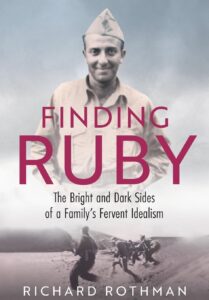Book Review: Rich Rothman’s Memoir
Finding Ruby: The Bright and Dark Sides of a Family’s Fervent Idealism, by Richard Rothman London: Whitefox Publishing, 2024, 297pp.
One of the author’s grandfathers volunteered for Spain and died from wounds suffered at Brunete. The widowed grandmother married her husband’s best friend, also a Spanish Civil War veteran, who made it home but never discussed his experiences in Spain. The author’s mother struggled all her life to understand why her father had abandoned her to go to Spain. An uncle he never knew played an important role in the defense of the Scottsboro Boys.
Despite all that, Richard Rothman, who was born in 1952, grew up knowing precious little about his family’s involvement with Spain, the Communist Party, and the broader culture of the Popular Front. After a forty-year career as a corporate lawyer, he took a deep dive into his family’s past, determined to learn as much of the truth as possible about his long-gone relatives.
His memoir, Finding Ruby: The Bright and Dark Sides of a Family’s Fervent Idealism, is a deeply felt narrative of family discovery, an example of what I like to call “kitchen table history”—an effort to hold what was learned growing up against more traditional historical sources and narratives. Rothman’s book tells two intertwined stories. One focuses on finding out the facts of his grandfather Ruby Schecter’s decision to volunteer for Spain, its impact on the family he left behind, and what happened to him there. The second story explores Rothman’s own feelings and imagination about what he might have done had he lived in the 1930s—and what Ruby might have done had he come home from Spain.
Rothman makes excellent use of some unlikely sources, including a biographical tribute to Ruby written in 1938 by the Lipkaner Bessarabia Progressive Society, one of the roughly 3,000 landsmanshafts, or mutual aid societies, formed in the US by Eastern European Jews and dedicated to the hometowns from which they emigrated. Some of his other sources are the pure product of serendipity. After Rothman’s mother died, in 2020, his wife Melissa took on the job of going through her mother-in-law’s belongings, deciding what to keep and what to throw out. She discovered what in the Rothman family came to be known as “the Briefcase.” Stuffed with old notebooks, letters, photographs, poetry, and newspaper clippings, it revealed Ruby, unexpectedly, as a serious student and writer of poetry before joining the Communist Party in 1933. Both he and his wife Rose became active in the Queens, NY branch of the CP, and both did support work for the Spanish Republic before Ruby sailed for Spain in March 1937 to join the XV Brigade. He was one of the relatively few volunteers who left behind a child (Rothman’s mother Taube)—and he did so with the full support of his wife Rose. “I wonder,” Rothman writes, “how much thought my grandfather gave to the prospect that he could be killed there and never see his daughter again—that he could be leaving her without a father. My guess is not very much.”
Rothman embarked on this project knowing very little about the broader historical context. As a “red diaper grandchild,” he learned virtually nothing about it over the kitchen table, where, instead, he encountered mostly silence and deeply repressed memories. Discoveries about his family came first, prompting him to educate himself about the history of the American volunteers in Spain, the American CP, and the Popular Front.
As he takes the reader with him on this journey, Rothman makes good use of the important scholarship produced by ALBA-affiliated authors such as Peter Carroll, Fraser Ottanelli, Sebastiaan Faber, and Adam Hochschild. At several points in his memoir, Rothman speculates on what he might have done had he been in his ancestors’ shoes. “Had I lived in the 1930s,” he writes, “would I have been a fellow traveler? An independent thinker attracted to the worthy causes championed by the Party but never a member? Or would I have taken the plunge like Ruby, Rose, Harry, and Irving? … The honest answer is I don’t know.”
Researching his family history, and writing this book, has clearly given Rothman a deeper understanding of how and why his family members made the choices they did. Yet he sometimes ignores historical contingency—the fact that people never know what their decisions might lead to—in favor of judgments that at times feel reductive. When Ruby, after being wounded in battle, is determined to get back to the Brunete front, Rothman describes his state of mind as a “selfless and courageous, but patently foolhardy, death wish.” Of his step-grandfather Harry Nobel, who survived Spain and spent decades as a fur worker, union organizer, and proud autodidact, he writes: “I’d never been able to understand why he continued stitching furs together for virtually his entire adult life.”
For Rothman, the revelations of Stalin’s crimes in the 1950s taint and somehow negate what people, including his family, did in the 1930s. He sees the story of his grandparents as “a lesson in idealism gone astray—or, perhaps more accurately put, idealism lured astray.” While he admires the ideals and sacrifices his forebears made, he finds it unfortunate that “they chose the wrong vehicle, driven by a fraudulent murderer, to rid the world of fascism, racism, and—to use Ruby’s words— ‘Hunger and Cold and Rooflessness.’” He takes solace in the fact that “there weren’t a lot of other cars going their way at the time.” Today, many of us are still looking for those other cars.
Daniel Czitrom is Chair Emeritus of the ALBA Board of Governors and author of the forthcoming Kitchen Table History: Wrestling with My Family’s Radical Past.













